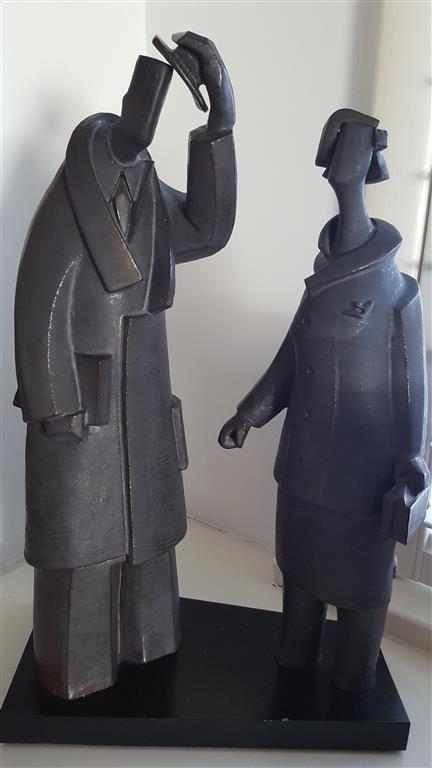
The virus has also highlighted the strengths of local directions over central commands—for instance, the provinces are doing a much better job than our federal government. (Sadly, even the roles the federal government should play in this pandemic—keeping Parliament functioning throughout and ensuring Canadian citizens & goods can travel across Canada unimpeded—were and are badly played.)
The Virtue of Nationalism
by Yoram Hazony
In the history of mankind, there have been three major ways of organizing the political world: tribes and clans, found in all pre-state societies; an international order controlled by an imperial state; and independent national states. Hazony and I choose the last as the best option for the flourishing of mankind—and that is the goal: to flourish, not to control.
Nationalism. “The nationalism I grew up with is a principled standpoint that regards the world as governed best when nations are able to chart their own independent course, cultivating their own traditions and pursuing their own interests without interference,” Hazony writes. He contrasts it with “imperialism, which seeks to bring peace and prosperity to the world uniting mankind…under a single political regime.” The old imperialism was more straightforward in its thirst for power and influence, whereas today ‘imperialism’ has morphed into ‘globalism’ and cloaked its drive for power in the pieties of saving mankind. “Liberal-imperialist political ideals have become among the most powerful agents fomenting intolerance and hate in the Western world today,” with the supreme example of this is the climate-change diktats from such high priests of this current religion as Al Gore & David Suzuki.

Its birth. Hazony traces the birth of the idea of independent national states as superior to international order to the Old Testament. “The Bible was born out of a deep-seated opposition” to the Egyptian or Babylonian imperial aim to unify humanity. Catholicism, then Protestantism continued this drive toward national states where “everything depends on a shared understanding of history, language, and religion that is passed from parents to children, but which outsiders can join as well.” But joining is predicated on embracing this ‘shared understanding’. The new liberal order preaches—and I use this term in its religious sense—a global order led by ‘experts’ and denigrates the history, language and religion of the national state. These so-called experts proliferate in academia, political parties on the left and the mainstream media. “They wish to see a world in which liberal principles are codified as universal law and imposed on the nations, if necessary by force.”
Ample witness to this use of force was the Summer of 2020 rioting, looting, burning & destroying led by the Left’s Antifa & BLM goons. A casualty of this new order is tolerance: I have never met anyone so intolerant as today’s progressives, who regress to ridicule, harassment, cancelation and force at the faintest hint of a different point of view.
Hazony outlines the principles of the order of national states:
- A nation is cohesive and strong enough to secure its political independence.
- A nation does not interfere in the internal affairs of other national states.
- A nation’s government has a monopoly of organized coercive force within the state.
- A nation maintains multiple centres of power.
- A nation protects minority nations & tribes within it.
- A nation does not transfer its powers of government to universal institutions.
Its ‘death’. Sadly “Both in Europe and America, we are watching the growth of a generation of young people that, for the first time in four hundred years, does not recognize the national state as the foundation of our freedoms.”

The Case for Nationalism: How It Made Us Powerful, United, and Free
By Rich Lowry
From Hazony’s global look at the national state, Lowry narrows the focus to defend the specific virtues of American nationalism. Lowry reiterates Hazony’s pedigree of the order of national states that begins with the Protestant Reformation, travels to America with the Puritans and remains the cornerstone of American nationalism today. He describes how American nationalism is inextricably interwoven with the collective ideals and the greatest achievements of the country. It is the cause and the result of American power.
While stating, “This is not a book about Donald Trump,” Lowry does admit “it is occasioned by him.” In contradiction to the vilification of Trump by the progressives en masse, Lowry recognizes the virtue in many of Trump’s stances that point to Abraham Lincoln’s ‘mystic chords of memory’—these stances resonate deeply with all men & women who join Trump in fighting against concentrations of unelected and unaccountable power. The swamp, in plainer words. One forbear of this stance Lowry describes is John Milton, the author of Paradise Lost, in his support of Cromwell against the ‘unelected and unaccountable’ power of King Charles, the First. “The power of Kings and Magistrates is nothing else, but what is only derivative, transferred and committed to them in trust from the People, to the Common good of them all, in whom the power yet remains fundamentally, and cannot be taken from them, without violation of their birthright,” Milton wrote.

The American ‘deplorables’ are saying that Trump was right to tell the United Nations that “Sovereign and independent nations are the only vehicle where freedom has ever survived, and democracy ever endured.”
Imagine
by The Babylon Bee

Imagine there’s no bread
It’s easy if you try
No tacos or hot sauce,
Nothing cold or fried,
Imagine all the people living in the gulags
You may say I’m a commie
But I’m not the only one
Did you say you didn’t like that?
Then it’s the gulag for you, son.
Everyone needs a home
The progressives reject that foundation of our freedoms and slather after a future that will be totally egalitarian and totally free and totally homogenous—a police state of perfection. They are future-addicted and have lost the way of becoming human”—not knowing where they’ve been, they’ve little sense of where to go—and are fueled more by hatred of the present than by a steady dedication to a Better Day,” writes Tracy Lee Simmons in her review of Nostalgia: Going Home in a Homeless World by Anthony Esolen. The progressive’s “easy virtue and virulent self-righteousness” in this era of deep ignorance of history and philosophy has led them to turn “original sin, which afflicts all mankind, into political error, which conveniently afflicts his opponents and not himself,” writes Esolen.
In Democracy in America written after the author’s visit to the US in the 1830s, Alexis de Tocqueville saw that a homogenous world order is not conducive to liberty. A liberal world order depends on many nations making many wagers about the future. It cannot be organized from above, as internationalists envision a world run by ‘experts’. Tocqueville saw in his travels that Americans’ labours of building a world together began in the family, in civic & religious associations, then in local, state and federal governments—NOT the other way around.

The pendulum inches back
Looking on the bright side, however, some promising developments are a harbinger of the pendulum inching back to the nation state from the liberal global dream of world government:
- Brexit – Britain voting to leave the European Union and conduct its affairs as an independent nation state—done in the face of the elites putting every obstacle in the British people’s way, starting with Article 50 of the Lisbon Treaty; Lord Kerr, the article’s drafter, told Nigel Lawson that he has written it so that it would be very difficult for any country to leave, “for the philosopher-kings of the EU do not want any damned-fool population getting in the way of the implementation of their wisdom,” Theodore Dalrymple so colourfully puts it.
- Trump – The US election of Donald Trump as president in 2016, and his subsequent exposure of the power-hungry ethos of the Left in the most dominant guise of the Democrats—again done in the face of the powers that be in government, academia, media & technology who harassed him and his government every day for the four years he was president, and then contaminated the electoral process to fraudulently elect the demented grifter who currently occupies the Oval Office.
- Eastern European nations, such as Hungary, Poland & Czech Republic, are resisting the European Union’s standards of behaviour on a number of fronts. As night follows day, we witnessed the Left foam at the mouth whenever a bit of praise or good news escapes the tech giants’ censors and is disseminated in the public square. Tucker Carlson’s visit to Hungary and interview with Viktor Orban, the country’s prime minister, caused the talking heads to explode at all the usual media outlets—outlets that are bleeding viewers as they rant & rave their soul-destroying cant.
Always & forever, it comes back to power—starting at the individual level of deciding where to live & where to work; how, when & where to travel; who & what to support and oppose. Are you willing to trade your freedom, honour & dignity for the ‘safety & security’ of big government? And they won’t be able to supply even that as systems break down in their brave new world.
If we don’t regain the balance of power to remain citizens with a dominant middle class in a national state, we will regress to a medieval society of lords—the elites—and peasants—the rest of us. Our Western liberal democracies will become the palimpsest of the decline and fall of the Roman Empire—and Edward Gibbon’s great history will become our story.

References:
- The Virtue of Nationalism by Yorum Hazony, 2018.
- “Nationalism’s Virtues” by Michael Doran, National Review, January 27, 2020, – book review of The Case for Nationalism by Rich Lowry.
- “John Lennon’s ‘Imagine’ Rereleased with More Realistic Description of Communism”, The Babylon Bee, February 21, 2020.
- “On the Way” by Tracy Lee Simmons, National Review, March 11, 2019, – book review of Nostalgia: Going Home in a Homeless World by Anthony Esolen.
- “Citizens Adrift” by Joshua Mitchell, City Journal, Autumn 2019.
- The New Criterion, January 2020.
